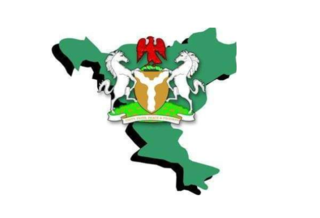
The vice president of Nigeria is the second-highest official in the executive branch of the federal government of Nigeria, after the president of Nigeria, and ranks first in the presidential line of succession. Officially styled vice president of the Federal Republic of Nigeria, the vice president is directly elected together with the president to a four-year term of office.

The Government of Rivers State consists of elected representatives and appointed officials responsible for the government of Rivers State, Nigeria. Rivers State has a population of about 5 million people, and is one of the 36 states that make up the Federal Republic of Nigeria. The state government is composed of the executive, legislative, and judicial branches, whose powers are vested by the Constitution in the House of Assembly, the Governor and the High Court. The judiciary operates independently of the executive and the legislature. At the local level, elected officials are in charge of local government areas.

The governor of Lagos State is the head of government of Lagos State in Nigeria. The governor leads the executive branch of the Lagos State Government. This position places its holder in leadership of the state with command authority over the state affairs. The Governor is frequently described to be the number one citizen of the state. Article II of the Constitution of Nigeria vests the executive power of the state in the governor and charges him with the execution of state law, alongside the responsibility of appointing state executive, diplomatic, regulatory, and judicial officers subject to the approval of the Assembly members.
The Governor of Rivers State is the Chief executive of the Rivers State government and is one of the governors of the thirty-six states of Nigeria. The Governor is supported by the Deputy Governor, both popularly elected for a term of four years. The Governor, as head of the executive branch, has the power to appoint commissioners responsible for each of the state's ministries, the heads of parastatals, judicial officers and the state-owned bodies with specific regulatory or administrative duties. They cannot be a member of the state's House of Assembly.
The Politics of Rivers State function within the framework of a presidential republic, with the Governor of Rivers State as both head of state and head of government. Rivers State is known for a politically engaged citizenry. The official seat of government is in Port Harcourt. Under the Constitution, Executive power is vested in the Governor. This does not change the fact that such authority may also be exercised through the Deputy Governor or Commissioners. Legislative power is vested in a 32-member unicameral House of Assembly. Judicial power is exercised solely by the judiciary of Rivers State.
Elections in Rivers State are supervised and conducted by two major electoral bodies, Rivers State Independent Electoral Commission (RSIEC) and the Independent National Electoral Commission (INEC). There are 23 local government areas, 319 electoral wards and 4442 polling units in the state. Elections for Governor and the House of Assembly are held every four years, along with federal elections for President and the National Assembly.

The deputy governor of Abia State is the second-highest officer in the executive branch of the government of Abia State, Nigeria, after the governor of Abia State, and ranks first in line of succession. The deputy governor is directly elected together with the governor to a four-year term of office.

The deputy governor of Lagos State is the second-highest officer in the executive branch of the government of Lagos State, after the governor of Lagos State, and ranks first in line of succession. The deputy governor is directly elected together with the governor to a four-year term of office.

The governor of Kaduna State is the head of government of Kaduna State in Nigeria. The governor is the head of the executive branch of the Kaduna State Government. The governor has a duty to enforce state laws and the power to either approve or veto bills passed by the Kaduna State House of Assembly, to convene the legislature and grant pardons.
The governor of Imo State is an elective political position, one of the governors of the thirty-six states of Nigeria. The governor of Imo State is the chief executive officer of Imo state and its executive branch with the assistance of the deputy governor. Fourteen people have served as governor since Imo State was created in 1976: eight military governors, two military administrators and seven democratic governors. The current governor is Hope Uzodinma of the All Progressives Congress, in office since 15 January 2020.
The Deputy Governor of Imo State is the political running-mate of the governor. He/she serves as the second highest executive official after the governor. On 15 January 2024, Chinyere Ekomaru was sworn in as Deputy Governor of Imo State.

The deputy governor of Jigawa State is the second-highest officer in the executive branch of the government of Jigawa State, Nigeria, after the governor of Jigawa State, and ranks first in line of succession. The deputy governor is directly elected together with the governor to a four-year term of office.

The deputy governor of Ondo State is the second-highest officer in the executive branch of the government of Ondo State, Nigeria, after the governor of Ondo State, and ranks first in line of succession. The deputy governor is directly elected together with the governor to a four-year term of office.

The deputy governor of Kaduna State is the second-highest officer in the executive branch of the government of Kaduna State, Nigeria, after the governor of Kaduna State, and ranks first in line of succession. The deputy governor is directly elected together with the governor to a four-year term of office.

The deputy governor of Borno State is the second-highest officer in the executive branch of the government of Borno State, Nigeria, after the governor of Borno State, and ranks first in line of succession. The deputy governor is directly elected together with the governor to a four-year term of office.

The deputy governor of Plateau State is the second-highest officer in the executive branch of the government of Plateau State, Nigeria, after the governor of Plateau State, and ranks first in line of succession. The deputy governor is directly elected together with the governor to a four-year term of office.

The deputy governor of Edo State is the second-highest officer in the executive branch of the government of Edo State, Nigeria, after the governor of Edo State, and ranks first in line of succession. The deputy governor is directly elected together with the governor to a four-year term of office. The deputy governor has the constitutional power to act as the governor in the event of the governor's death, resignation, impeachment, or absence. The deputy governor also assists the governor in the administration of the state and performs any other duties that the governor may assign to him or her.
The deputy governor of Taraba State is the second-highest officer in the executive branch of the government of Taraba State, Nigeria, after the governor of Taraba State, and ranks first in line of succession. The deputy governor is directly elected together with the governor to a four-year term of office.

The deputy governor of Oyo State is the second-highest officer in the executive branch of the government of Oyo State, Nigeria, after the governor of Oyo State, and ranks first in line of succession. The deputy governor is directly elected together with the governor to a four-year term of office.














